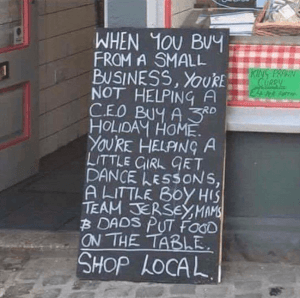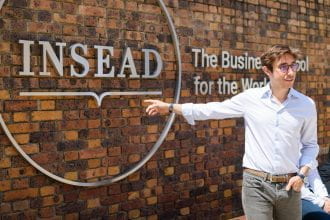 When you buy from a small business, you’re not helping a CEO buy a third home. You’re helping a little girl get dance lessons, a little boy his team jersey, mams and dads put food on the table. Shop local. – Quoted from a photograph of a chalkboard outside an unknown small restaurant (see image to the left).
When you buy from a small business, you’re not helping a CEO buy a third home. You’re helping a little girl get dance lessons, a little boy his team jersey, mams and dads put food on the table. Shop local. – Quoted from a photograph of a chalkboard outside an unknown small restaurant (see image to the left).
Big cities can be anonymous places and soon two-thirds of the world’s population will live in them.
“In cities we’re so focused on our own fast-paced lives that we forget to appreciate the richness of the world around us,” says Kevin Tayebaly MBA’15J, who along with classmate Jerome Dewavrin MBA’15J co-founded Village Map, a Paris-based startup.
“Village Map creates villages within the city,” says Jerome. “In a village, there is a feeling of being part of a community where you‘re connected to the things and people you live with.”
How does Village Map do that? By providing a website (villagemap.fr, also available in English) where local and visiting consumers can find and order all the products that exist around them in nearby local shops.
About 40 percent of small shopkeepers in Paris have a website but these get no traffic. Village Map centralises these websites on their platform to provide local shopkeepers with traffic and visibility.
“Our fight,” Kevin declares, “is to recreate a connection between consumers and struggling local shops. These shops have a huge socio-economic value in cities as they directly impact local employment, the life of the neighbourhoods they’re in, and the attractiveness of cities.”
The duo launched Village Map immediately after graduating less than a year ago. Today they have a staff of 10 and already have signed up 300 local shop owners in 15 Parisian neighbourhoods.
The site currently presents 4,000 locally produced products ranging from home decor, furniture, clothing, fashion, jewellery, gourmet foods and wine. Plans are to have 700 merchants from most Parisian districts online by the end of the year, and then to expand Village Map to other cities across Europe beginning with Rome in 2017.
INSEAD as incubator
The team was able to launch Village Map right after graduation because of how they used their ten months at INSEAD.
“Every move we made, every class we took, every event we attended was with Village Map in mind,” says Kevin. “At one point during the year there were more than 40 students and 15 teachers involved and many of them still are.”
It was during one entrepreneurship class that Kevin and Jerome met. “We were both pitching the same idea so that’s when we decided to work together,” Jerome recalls.
While still taking classes, the duo conducted a pilot programme for Village Map that involved 30 stores. They also participated in venture and social venture competitions. These competitions attracted the attention of venture funds, one of which started a due diligence with Village Map.
As vice president of the Technology, Media and Telecom (TMT) student club, Kevin founded the “Paris Tech Tour” after organising a day trip to Paris to showcase the city’s entrepreneurial resources. As a by-product of that trip, Kevin became well connected with the Parisian start-up ecosystem which still contributes to Village Map today.
Funding success
Two weeks after graduation, Jerome and Kevin met with another INSEAD alumnus, chairman of a well-known family retail business who shared the team’s vision of using local commerce as a lever for economic and social development in the city.
The company immediately decided to back Village Map and invested €275,000 in the venture.
After that, Kevin and Jerome offered the same investment conditions to their ‘15J classmates. They raised €55,000 from 44 investors in 29 countries and created Fonty Capital, a holding company, to represent the 44 investors in a single entity.
“This was a big success for three reasons,” says Jerome. “It opened 44 international networks, it offers expertise from people in lot of different fields, and it gave us a lot of credibility from future investors who saw our international funding as a sign of our ambition to scale internationally.”
Village Map is currently seeking to raise an additional €1 million and is conducting a business angel round that will close at the end of June.
“INSEAD is a de facto accelerator that you can profit from really well if you know how to use its resources,” Kevin advises. “For an entrepreneurial student the potential of the school is limitless.”
Awards
Village Map has been quick to notch up even more success in the last few months. Kevin and Jerome won the first two contests they participated in, including the Boston Consulting Group’s “Young Social Entrepreneurs of the Year” award.
Village Map has also been selected by the City of Paris to roll out its app throughout the capital, not just on smartphones but on 100 new bus station touch screens at the end of May.
Speaking of awards, Jerome says that INSEAD’s ranking in January as the best MBA global programme in the world could not have come at a better time.
“It was perfect timing for us in terms of our current fundraising,” he says. “We are using these investments to help preserve the unique heritage of European cities and protect it from the large international players who could destroy it.”
According to Kevin, this includes Google, Amazon, Facebook, Apple and Alibaba who combined are equal to Russia in terms of economic power.
“That is a dangerous concentration of power,” he says, ”The value that these quasi-monopolistic players capture is not reinvested locally since taxes are paid in Dublin or Luxemburg instead of France, the UK, Germany, Italy and so on. Moreover the jobs they create are mainly in the US not in Europe.”
“We believe that the digital world should work hand-in-hand with small players,” concludes Jerome. “We need to preserve diversity, to preserve the small-scale, otherwise all the streets are going to look the same. This is the topic we are addressing.”


